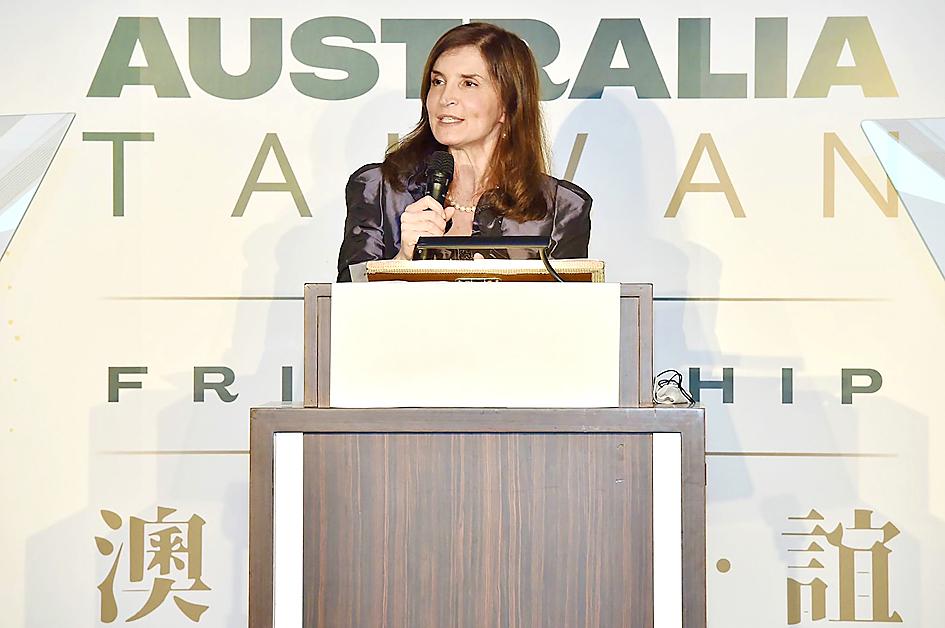The Australian Office in Taipei on Tuesday marked the 40th anniversary of its establishment at a ceremony attended by President Tsai Ing-wen (蔡英文), who pledged to deepen trade and security ties with Canberra.
Under the leadership of Australian Representative to Taiwan Jenny Bloomfield, who took office in February, bilateral relations are expected to become even closer, Tsai said according to a transcript of her speech released by the Presidential Office.
Over the past five years, trade and investment between Taiwan and Australia have grown 10 to 13 percent annually, showing that bilateral relations are strong and mutually beneficial, she said.

Photo courtesy of Australian Office in Taipei via CNA
“I want to take this opportunity to thank everyone across Australia who has come out in support of Taiwan’s inclusion in the CPTPP,” Tsai said, referring to the Comprehensive and Progressive Agreement for Trans-Pacific Partnership.
“By joining this trade bloc and negotiating a bilateral economic cooperation agreement, we can take significant steps forward in our trade relationship,” she added.
Australia is a key partner for Taiwan’s energy transition, with the goal to achieve carbon neutrality by 2050, Tsai said, adding that the two countries would work together toward the Asia-Pacific region’s sustainable development.
“Taiwan and Australia are both committed to upholding security, stability and prosperity in the Indo-Pacific,” Tsai added.
The Australian government this year repeatedly spoke up in support of Taiwan’s international participation, and emphasized the importance of peace and stability in the Taiwan Strait, she said.
“Taiwan remains committed to working with our Australian colleagues to safeguard our region and uphold our shared values of democracy, freedom and the rule of law,” Tsai said.
The Australian office hailed next year as “Australia-Taiwan Friendship Year,” which is to include an arts exchange partnership to support cultural and arts exchanges between young people, with particular focus on members of Aboriginal communities.
The office also launched the “40 Years, 40 Stories” project to showcase personal stories told from Taiwanese and Australian perspectives to demonstrate the breadth and depth of the bilateral relationship.
“Australia is proud to be Taiwan’s second-most popular education destination, and we are working together to promote Taiwan’s Bilingual 2030 goal,” the office said.
Australia is Taiwan’s largest energy provider, and the nations are natural partners in the transition to net-zero carbon emissions through technologies such as hydrogen, the office said, highlighting the importance of strong and reliable supply chains.
The ties also continue to deepen through thriving trade in premium food and agricultural products, development cooperation, and cooperation in international fora, such as APEC, the WTO and the Global Cooperation and Training Framework, which was created by Taiwan and the US, it said.
The ceremony was also attended by Presidential Office Secretary-General David Lee (李大維), Ministry of Foreign Affairs Secretary-General Lily Hsu (徐儷文), Academia Sinica President James Liao (廖俊智), Democratic Progressive Party legislators Chiu Yi-ying (邱議瑩) and Lo Chih-cheng (羅致政), National Culture and Arts Foundation chairwoman Lin Mun-lee (林曼麗) and foreign representatives of other nations, the Presidential Office said.

POSITIVE DEVELOPMENT: Japan and the US are expected to hold in-depth discussions on Taiwan-related issues during the meeting next month, Japanese sources said The holding of a Japan-US leaders’ meeting ahead of US President Donald Trump’s visit to China is positive news for Taiwan, former Japan-Taiwan Exchange Association representative Hiroyasu Izumi said yesterday. After the Liberal Democratic Party’s landslide victory in Japan’s House of Representatives election, Japanese Prime Minister Sanae Takaichi is scheduled to visit the US next month, where she is to meet with Trump ahead of the US president’s planned visit to China from March 31 to April 2 for a meeting with Chinese President Xi Jinping (習近平). Japan and the US are expected to hold in-depth discussions on Taiwan-related issues during the

‘LIKE-MINDED PARTNER’: Tako van Popta said it would be inappropriate to delay signing the deal with Taiwan because of China, adding he would promote the issue Canadian senators have stressed Taiwan’s importance for international trade and expressed enthusiasm for ensuring the Taiwan-Canada trade cooperation framework agreement is implemented this year. Representative to Canada Harry Tseng (曾厚仁) in an interview with the Central News Agency (CNA) said he was increasingly uneasy about Ottawa’s delays in signing the agreement, especially as Ottawa has warmed toward Beijing. There are “no negotiations left. Not only [is it] initialed, we have three versions of the text ready: English, French and Mandarin,” Tseng said. “That tells you how close we are to the final signature.” Tseng said that he hoped Canadian Prime Minister Mark Carney

President William Lai (賴清德) yesterday bestowed one of Taiwan’s highest honors on Saint Vincent and the Grenadines (SVG) Ambassador Andrea Clare Bowman in recognition of her contributions to bilateral ties. “By conferring the Order of Brilliant Star with Grand Cordon on Ambassador Bowman today, I want to sincerely thank her, on behalf of the Taiwanese people, for her outstanding contribution to deepening diplomatic ties between Taiwan and SVG,” Lai said at a ceremony held at the Presidential Office in Taipei. He noted that Bowman became SVG’s first ambassador to Taiwan in 2019 and

A man walks past elementary school artworks at the Taipei Lantern Festival in Ximen District yesterday, the first day of the event. The festival is to run from 5pm to 10pm through March 15.